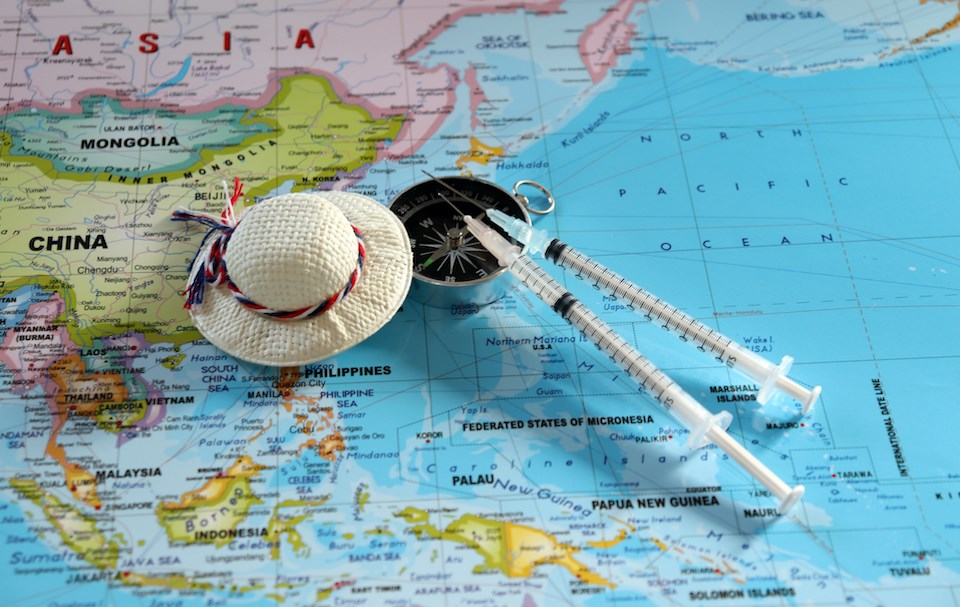Heading on a trip to a country that you've never visited before?
A travel vaccination clinic should be among the first places you visit after you've booked tickets -- but it might be an even better idea to head to one before buying them.
Nurse Director Prab Cockar says some people return from trips with horror stories about getting sick overseas because they weren't aware of viruses and bacterial infections they could pick up while they were away.
Travellers' vaccinations not covered by MSP in B.C.
The B.C. government covers the cost of some vaccinations, such as ones for COVID-19 and influenza, for people who are enrolled in the . A prescription is not needed for these vaccines.
But people who receive vaccinations only for travel are not eligible for coverage under the provincial plan.
A visit to the clinic can be a "one-stop-shop" for potential travellers, Cockar told V.I.A. When they book a consultation, a health care professional will break down all of the health risks associated with travelling to their destination, including ones that can be prevented with immunization or treated by prescription and ones that cannot, and even what to consider about drinking local water and eating food.
Since travel resumed following the pandemic, the clinic has seen a steady increase in appointments for travel-related vaccinations. However, there are several safety factors to consider, such as a client's age and medical history, as well as the unique destination they plan to visit.
What to expect at the travel vaccine clinic
"Our consultants will review [the patient's] medical history, what vaccines they had as kids and then we discuss where they are travelling. We look at the full itinerary and search the place and the time of year," she said.
The clinic always recommends purchasing a comprehensive travel insurance plan that includes robust medical coverage for emergencies.
Immediately following the consultation, the patient can get vaccinated in the clinic and is given a prescription to pick up medication at their local pharmacy; they don't need to return for a follow-up visit.
The entire visit, including the consultation and vaccines, generally costs an average of $60, Cockar explained.
What kinds of vaccines do the clinics offer?
Some vaccines they routinely administer are for viruses like Hepatitis A and B -- which are recommended worldwide -- and ones that may be more specific to exotic destinations, such as a Typhoid fever shot for travel to South East Asia.
They also administer , such as ones that prevent HPV, Influenza, Shingle, Tetanus, Diphtheria, Pertussis/Whooping Cough, and more.
For diseases that can't be prevented by vaccines or medication, such as dengue fever, the clinic will detail the steps necessary to prevent an infection. Since it is a mosquito-borne illness found mostly in tropical and sub-tropical climates, the best way to prevent getting sick is by covering up, such as wearing protective clothing and sleeping in a mosquito net. People should also use a mosquito repellent, such as DEET, to keep the harmful pests off of them.
While between 100 and 400 million people are infected with the dengue virus annually, many cases cause asymptomatic or mild illness. However, a severe dengue infection can cause . Except for pain management, there is no treatment for the virus, according to the World Health Organization (WHO).
Some destinations should be avoided due to health risks
Knowing what destinations put you at greater risk for contracting particular viruses, as well as what resources may be available to you, may determine whether or not you want to visit a particular destination. For example, women who plan on becoming pregnant may want to avoid travelling to countries where it is possible to contract the Zika virus, which also does not have a vaccine.
While the Zika virus doesn't often cause severe illness in adults, pregnant women who get infected with the virus may give birth to a baby born with "microcephaly and other as well as preterm birth and miscarriage," says the WHO. Cases of the virus have occurred on many continents, including Africa, the Americas, Asia, and the Pacific, but some individual destinations may carry a greater risk.
The Â鶹´«Ã½Ó³»Coastal Health (VCH) also provides "travel prescriptions, health advice, and vaccine recommendations based on an individual’s medical history and travel itinerary."
The coastal health authority says it is vital for people to get the appropriate vaccines before they travel outside of Canada.




